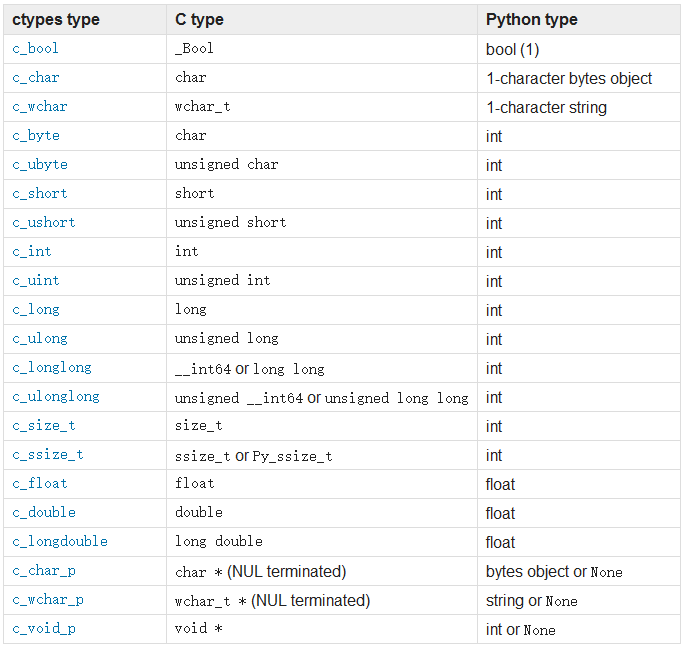1
2
3
4
5
6
7
8
9
10
11
12
13
14
15
16
17
18
19
20
21
22
23
24
25
26
27
28
29
30
31
32
33
34
35
36
37
38
39
40
41
42
43
44
45
46
47
48
49
50
51
52
53
54
55
56
57
58
59
60
61
62
63
64
65
66
67
68
69
70
71
72
73
74
75
76
77
78
79
80
81
82
83
84
85
86
87
88
89
90
91
92
93
94
95
96
97
98
99
100
101
102
103
104
105
106
107
108
109
110
111
112
113
114
115
116
117
118
119
120
121
122
123
124
125
126
127
128
129
130
131
132
133
134
135
136
137
138
139
140
141
142
143
144
145
146
147
148
149
150
151
152
153
154
155
156
157
158
159
160
161
162
163
164
165
166
167
168
169
170
171
172
173
174
175
176
177
178
179
180
181
182
183
184
| from ctypes import *
import cv2
import numpy as np
lib = CDLL("./libcapi.so", RTLD_GLOBAL)
"""
// struct
struct Point{
float x, y;
};
// pure C API
SHARED_EXPORT int add(int a, int b);
SHARED_EXPORT float addf(float a, float b);
SHARED_EXPORT void print_point(Point* p);
// warpper for c++ class
SHARED_EXPORT void wrapper_init_class(int id);
SHARED_EXPORT void wrapper_free_class();
SHARED_EXPORT int wrapper_add(int a, int b);
SHARED_EXPORT float wrapper_addf(float a, float b);
SHARED_EXPORT void wrapper_print_point(Point* p);
"""
class POINT(Structure):
_fields_ = [("x", c_float),
("y", c_float)]
lib.add.argtypes = [c_int, c_int]
lib.add.restype = c_int
lib.addf.argtypes = [c_float, c_float]
lib.addf.restype = c_float
lib.print_point.argtypes = [POINTER(POINT)]
lib.print_point.restype = None
lib.wrapper_init_class.argtypes = [c_int]
lib.wrapper_init_class.restype = None
lib.wrapper_free_class.argtypes = None
lib.wrapper_free_class.restype = None
lib.wrapper_add.argtypes = [c_int, c_int]
lib.wrapper_add.restype = c_int
lib.wrapper_addf.argtypes = [c_float, c_float]
lib.wrapper_addf.restype = c_float
lib.wrapper_print_point.argtypes = [POINTER(POINT)]
lib.wrapper_print_point.restype = None
def test_capi():
print("test_capi")
print(lib.add(3,5))
print(lib.addf(3.3,5.5))
p = POINT(9.1,9.2)
print(p)
print(p.x, p.y)
lib.print_point(byref(p))
lib.print_point(pointer(p))
def test_wrapper_capi():
print("test_wrapper_capi")
lib.wrapper_init_class(100)
print(lib.wrapper_add(3,5))
print(lib.wrapper_addf(3.3,5.5))
p = POINT(9.1,9.2)
print(p)
print(p.x, p.y)
lib.wrapper_print_point(byref(p))
lib.wrapper_print_point(pointer(p))
lib.wrapper_free_class()
class IMAGE_FLOAT(Structure):
_fields_ = [("h", c_int),
("w", c_int),
("c", c_int),
("data", POINTER(c_float))]
class IMAGE_CHAR(Structure):
_fields_ = [("h", c_int),
("w", c_int),
("c", c_int),
("data", POINTER(c_ubyte))]
lib.process_image_float.argtypes = [IMAGE_FLOAT]
lib.process_image_float.restype = None
lib.process_image_char.argtypes = [IMAGE_CHAR]
lib.process_image_char.restype = None
def mat_to_darknet_image_float(bgr):
rgb = cv2.cvtColor(bgr, cv2.COLOR_BGR2RGB)
rgb = rgb.transpose(2, 0, 1)
c = rgb.shape[0]
h = rgb.shape[1]
w = rgb.shape[2]
arr = np.ascontiguousarray(rgb.flat, dtype=np.float32) / 255.0
data = arr.ctypes.data_as(POINTER(c_float))
im = IMAGE_FLOAT(w, h, c, data)
return im, arr
def mat_to_image_float(bgr):
print(bgr.shape)
(h,w,c) = bgr.shape
arr = np.ascontiguousarray(bgr.flat, dtype=np.float32)
data = arr.ctypes.data_as(POINTER(c_float))
im = IMAGE_FLOAT(h, w, c, data)
return im, arr
def mat_to_image_char(bgr):
print(bgr.shape)
(h,w,c) = bgr.shape
arr = np.ascontiguousarray(bgr.flat, dtype=np.uint8)
data = arr.ctypes.data_as(POINTER(c_ubyte))
im = IMAGE_CHAR(h, w, c, data)
return im, arr
def test_process_image_float():
image_filepath = "dog.jpg"
bgr = cv2.imread(image_filepath)
im, arr = mat_to_image_float(bgr)
lib.process_image_float(im)
def test_process_image_char():
image_filepath = "dog.jpg"
bgr = cv2.imread(image_filepath)
im, arr = mat_to_image_char(bgr)
lib.process_image_char(im)
def main():
test_process_image_float()
test_process_image_char()
if __name__ == "__main__":
main()
|
